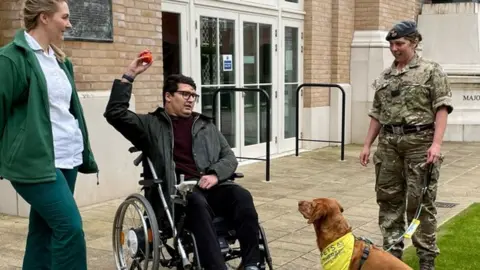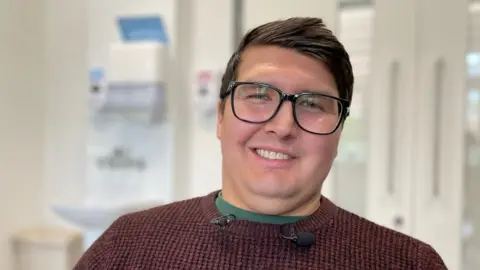Pet therapy helps soldier recover from stroke
 BBC
BBCA soldier who says he came close to death has spoken about how he was helped by a dog called Aspen.
James Lloyd, 29, who is serving in the Royal Military Police, suffered the first of two serious strokes as he was preparing to deploy to Afghanistan when he was just 26.
He is currently undergoing treatment at Stanford Hall in Nottinghamshire, the national defence rehabilitation centre.
He said working with Aspen - who is a therapy dog at the hall - had helped.

Cpl Lloyd, from Shropshire, was on an officers course with the Royal Military Police when he suffered an aortic dissection while in training which required heart surgery.
The first stroke was a complication while the second happened months later.
Since then, he has had to learn to walk all over again.
"I've lost the use of my left hand," he said.
"Coming here, with work colleagues, we all share the same kind of interests and issues - going from really active to really inactive.
"I think military humour is quite good at laughing about it and getting on with it."
 James Lloyd
James LloydHe said doing rehabilitation with Aspen - an eight-year-old Labrador cross - was "brilliant".
"I've got dogs at home," he said.
"I've got problems with my voice, so having the chance to shout at Aspen is good practice.
"It cheers me up quite a lot and, as I throw the ball, it's obviously good shoulder mobility."

Analysis
By Jeremy Ball, BBC East Midlands Today
It's almost five years since Stanford Hall replaced the military rehabilitation centre at Headley Court.
The sessions with Aspen are part of a wide range of therapies, which reflect changing times.
There have been fewer battlefield causalities and amputations since the UK's withdrawal from Afghanistan.
But many patients have neurological conditions and need to learn how to walk and balance again.
James is being retrained using cutting-edge gaming technology. That uses virtual reality to help him practise navigating real-life scenarios.
He is also preparing to leave the military and find a new career, so there's a focus on vocational training too.

Flt Lt Claire Crichton, an RAF physiotherapist, said: "The point is to have fun but also to get that interaction between patient and animal.
"We know there are proven benefits from a mental health perspective but we can also incorporate the physio elements from James' recovery pathway."

Follow BBC East Midlands on Facebook, Twitter, or Instagram. Send your story ideas to [email protected].
